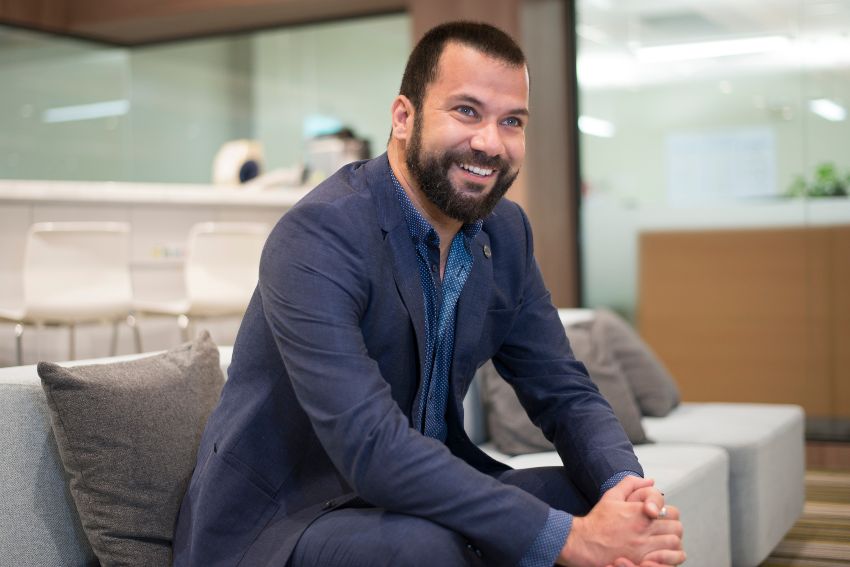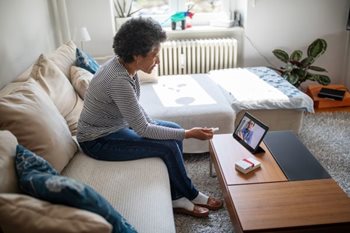3 December 2020
What Digital Health Can Solve in a Global Crisis
By Felicia Campbell
[5 minute read]

The coronavirus pandemic has drastically changed the way the world operates. Many aspects of daily life have become "digitalized," including healthcare. These innovations in healthcare now go far beyond the familiar telehealth, meaning the widespread use of telephone consultations between patients and healthcare providers.
The industry now includes entirely new therapeutic modalities that use digital technologies to replace, complement or augment innovative medical treatments. To explore the implications of this dynamic area of care, we sat down to talk virtually with Dr. Ramin Rafiei (pictured above), a physicist, senior digital healthcare executive, healthcare visionary, and instructor and program advisor for UC San Diego Extension's Department of Healthcare Research and Policy.
He discussed the future of the healthcare industry and what digital health means for patients, providers, researchers and transitioning healthcare professionals.
What is digital health?
You'll hear different definitions from academics versus the tech companies and startups versus biopharma and other parties. But for me, I think of digital health as an umbrella term that encompasses multiple areas, like  mobile health, wearable devices, augmented reality, digital medicines, and digital biomarkers.
mobile health, wearable devices, augmented reality, digital medicines, and digital biomarkers.
The FDA has offered no formal definition at this time, though with their recent launch of the Digital Health Center of Excellence, I think they are going down that path at some point soon. The fact that the definition of "digital health" is rather nebulous right now can actually be seen as a good thing, as it opens up a lot of opportunities to be innovative and not be boxed in by certain perspectives.
What are the biggest benefits of digital healthcare for patients?
It boils down to increased access, sustained engagement and convenience for the user, which is the patient. When you achieve these three, you improve health outcomes, which is the single most powerful lever for reducing healthcare costs.
The amazing thing about digital health is that we can now modulate individualized treatment for patients instead of the broad approach that is currently seen. Personalization is now truly possible.
What advice would you give to both current and aspiring healthcare professionals who are working hard to adapt right now?
Stay curious about the myriad of new opportunities that are being created. Spend time educating yourself on the digitalization of care delivery and how you can use it to scale your efforts and impact. I think long-term and look at the trends which have upended other industries. Healthcare is not immune, and COVID has just shortened the timelines. And keep in mind that healthcare transformation is difficult. We need to persevere. And remember, failure is feedback. Keep going.
I said before; digital health eventually becomes health. But it will take quite some time due to current limits. This won't happen until the industry matures in its thinking. Unfortunately, many are treating this like a gold rush, which is hurting patients and stakeholders. The digital health industry is part of the healthcare industry and needs to lead with evidence, not product demos.

How can healthcare professionals embrace digital healthcare moving forward?
Medical school training needs to be updated for digital healthcare. Professionals and practitioners need to supplement their education and experience with courses like the UC San Diego Extension Digital Health Certificate to remain competitive. Led by industry practitioners, nothing in the upcoming Digital Health Business and Commercialization Strategies course is theoretical, and none of it is pulled from a business textbook. The information comes from industry experience and hard-learned lessons. Some, frankly, painful.
This program will walk medical practitioners, entrepreneurs, investors and industry executives through five modules that break down the business of digital health in a way that is actionable. This includes examining how to build a business that adds value to the industry, exploring ways to incentivize the many different stakeholders, strategies for navigating regulatory hurdles, ways to differentiate yourself in the market, and how to get funded. We also study industry successes and failures. Ultimately business models drive new behaviors, while technology facilitates these behaviors. The future of our industry can be found precisely at this intersection.
Can you offer a hypothetical example of how digital health will be implemented?
Most of life happens outside of the clinical environment, and that is where we can get the best measurements of health. Further, no two patients are the same, and neither is their response to the same treatment. So, let's say you have a patient with a neurodegenerative condition like Parkinson's disease. Any clinical support is currently based on infrequent visits, whereas digital biomarkers could be used to measure the effectiveness of therapy and progression of disease objectively and at high frequency in order to optimize their treatment and care on a continuous basis. The phone is a ubiquitous tool and widely available across all segments of society. But how can we tap into that for determining health aspects? Again, the validation and regulation issues are present but being addressed.
 Are there clinical limitations to digital healthcare?
Are there clinical limitations to digital healthcare?
Absolutely. Just like any other advances in technology, there is no magic switch where everyone is an adopter of innovation. Digital health has its own hurdles, but I think, eventually, digital health will just become health. The question is when and after which hurdles. Artificial intelligence and machine learning will play a role but will take some work. Validation of digital health is also needed, and the FDA will help, but it's the Wild-West phase. Determining what works and what does not will take some time, I feel.
It's clear why these technologies are so important at a time when high-risk populations want to avoid visits to the hospital but are there benefits that extend beyond our current crisis?
Absolutely. My own goal has been to make health measurable, accessible, and sustainable at scale. We want to empower the patient with the tools they already have to transition towards personalized health. We live in a society where the smartphone is the hub for all things, and we use it throughout the day and tether multiple devices like our car, music, smart appliances and more to it. So, it just makes sense for health to be centered in the home as well.
Ultimately digital health's greatest value proposition is the decentralization of care delivery. I feel the pandemic has solidified this core value proposition, with the home becoming the new center of care.
You were innovating in healthcare long before the pandemic hit, so clearly, you saw a need for digital healthcare even in a pre-pandemic environment. Can you talk about what inspired you to follow this path?
I am trained as a nuclear physicist and later became an associate professor of photonics. So I was blessed to have been trained in the areas of big data, artificial intelligence, machine learning and novel sensing long before they were popularized. Combining this deep technical knowledge with my own [serial] entrepreneurial career, the opportunity for transformation in healthcare became evident. In recent years, I have been busy architecting the field of connected therapeutics, which combines the scalability and personalization of digital therapeutics with the high chronic utilization for biologics, in order to improve patient outcomes across a myriad of complex chronic conditions.
The Specialized Certificate in Digital Health, a 100% online program, combines aspects of healthcare administration, public health, ethics and strategies for commercialization and business development. Learn more today.